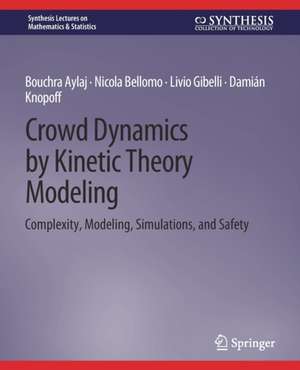Crowd Dynamics by Kinetic Theory Modeling: Complexity, Modeling, Simulations, and Safety: Synthesis Lectures on Mathematics & Statistics
Autor Bouchra Aylaj, Nicola Bellomo, Livio Gibelli, Damián Knopoffen Limba Engleză Paperback – 22 oct 2020
Din seria Synthesis Lectures on Mathematics & Statistics
- 17%
 Preț: 363.65 lei
Preț: 363.65 lei -
 Preț: 282.50 lei
Preț: 282.50 lei -
 Preț: 324.22 lei
Preț: 324.22 lei -
 Preț: 418.07 lei
Preț: 418.07 lei - 17%
 Preț: 458.98 lei
Preț: 458.98 lei - 17%
 Preț: 361.22 lei
Preț: 361.22 lei -
 Preț: 425.75 lei
Preț: 425.75 lei -
 Preț: 419.06 lei
Preț: 419.06 lei -
 Preț: 320.40 lei
Preț: 320.40 lei -
 Preț: 263.67 lei
Preț: 263.67 lei -
 Preț: 322.31 lei
Preț: 322.31 lei -
 Preț: 419.06 lei
Preț: 419.06 lei -
 Preț: 322.31 lei
Preț: 322.31 lei - 17%
 Preț: 360.54 lei
Preț: 360.54 lei -
 Preț: 321.34 lei
Preț: 321.34 lei -
 Preț: 283.04 lei
Preț: 283.04 lei -
 Preț: 332.88 lei
Preț: 332.88 lei - 15%
 Preț: 525.54 lei
Preț: 525.54 lei -
 Preț: 265.59 lei
Preț: 265.59 lei -
 Preț: 327.11 lei
Preț: 327.11 lei -
 Preț: 328.08 lei
Preț: 328.08 lei -
 Preț: 319.43 lei
Preț: 319.43 lei -
 Preț: 298.64 lei
Preț: 298.64 lei -
 Preț: 262.04 lei
Preț: 262.04 lei - 15%
 Preț: 495.68 lei
Preț: 495.68 lei -
 Preț: 318.66 lei
Preț: 318.66 lei -
 Preț: 418.25 lei
Preț: 418.25 lei -
 Preț: 267.86 lei
Preț: 267.86 lei -
 Preț: 236.73 lei
Preț: 236.73 lei -
 Preț: 234.87 lei
Preț: 234.87 lei -
 Preț: 415.18 lei
Preț: 415.18 lei -
 Preț: 453.78 lei
Preț: 453.78 lei -
 Preț: 488.71 lei
Preț: 488.71 lei -
 Preț: 265.78 lei
Preț: 265.78 lei -
 Preț: 269.99 lei
Preț: 269.99 lei -
 Preț: 416.92 lei
Preț: 416.92 lei -
 Preț: 319.12 lei
Preț: 319.12 lei -
 Preț: 191.30 lei
Preț: 191.30 lei -
 Preț: 452.03 lei
Preț: 452.03 lei -
 Preț: 382.95 lei
Preț: 382.95 lei -
 Preț: 158.83 lei
Preț: 158.83 lei -
 Preț: 455.51 lei
Preț: 455.51 lei -
 Preț: 384.41 lei
Preț: 384.41 lei -
 Preț: 319.12 lei
Preț: 319.12 lei -
 Preț: 487.75 lei
Preț: 487.75 lei -
 Preț: 346.76 lei
Preț: 346.76 lei -
 Preț: 298.60 lei
Preț: 298.60 lei -
 Preț: 260.18 lei
Preț: 260.18 lei
Preț: 260.18 lei
Nou
Puncte Express: 390
Preț estimativ în valută:
49.79€ • 51.44$ • 41.42£
49.79€ • 51.44$ • 41.42£
Carte tipărită la comandă
Livrare economică 19 martie-02 aprilie
Preluare comenzi: 021 569.72.76
Specificații
ISBN-13: 9783031013003
ISBN-10: 303101300X
Pagini: 86
Ilustrații: XII, 86 p.
Dimensiuni: 191 x 235 mm
Greutate: 0.19 kg
Editura: Springer International Publishing
Colecția Springer
Seria Synthesis Lectures on Mathematics & Statistics
Locul publicării:Cham, Switzerland
ISBN-10: 303101300X
Pagini: 86
Ilustrații: XII, 86 p.
Dimensiuni: 191 x 235 mm
Greutate: 0.19 kg
Editura: Springer International Publishing
Colecția Springer
Seria Synthesis Lectures on Mathematics & Statistics
Locul publicării:Cham, Switzerland
Cuprins
Preface.- Complexity of Human Crowds and Modeling Strategy.- Scaling and Mathematical Structures.- From Classical Kinetic Theory to Active Particle Models.- Kinetic Theory Models and Applications.- Kinetic Theory Models Toward Research Perspectives.- Authors' Biographies.
Notă biografică
Bouchra Aylaj is an Associate Professor with Habilitation in mathematics at University of Hassan II of Casablanca, Faculty Ain Chock, Morocco. She started her career in 2006 when she was called to develop a research program on mathematical modelling in biology. Her scientific activity has been focused on the following topics: scientific computing and control for risk analysis and analytical and computational problems in epidemiology. Subsequently, she moved her scientific interests to the modeling and related safety problems focused on social behaviors in human crowds.
Nicola Bellomo is a distinguished professor at the University of Granada and Professor Emeritus at the Polytechnic University of Torino. He started his career in 1980 when he was called to cover the chair of mathematical physics and applied mathematics due to his scientific achievements on the mathematical theory of the Boltzmann equation and of stochastic differential equations. Subsequently, he moved his scientificinterests to the study of living systems, becoming one of the pioneers of the development of active particles methods to the modeling of large systems of self-propelled interacting entities. He is author of two books published by Birkhauser devoted to this topic. In 2009, he delivered the prestigious Shank Lecture on the modeling of immune competition, and was awarded the “Third Level Honor” in 2016 for scientific merits by the President of the Italian Republic.
Livio Gibelli is a Lecturer in Mechanical Engineering at the University of Edinburgh. He received his Ph.D. in applied mathematics from the Politecnico di Milano and, prior to the current position, he worked as Research Fellow at the University of Warwick, Politecnico di Milano, Politecnico di Torino, and University of British Columbia. His main research interests include non-equilibrium multiphase fluid flows, the continuum description of slightly rarefied gases, the numerical methods for solving kinetic equations,and the modeling of crowd dynamics.
Damian Knopoff is a chemical engineer and mathematician, holding a Ph.D. in Mathematics from Cordoba National University. Currently, he is an Associate Researcher at the Argentinian Scientific and Technical Research Council. His main research fields include nonlinear dynamical systems and numerical methods for differential equations with applications to the modeling and simulation of complex living systems, including biological phenomena, socio-economic systems, and crowd dynamics.
